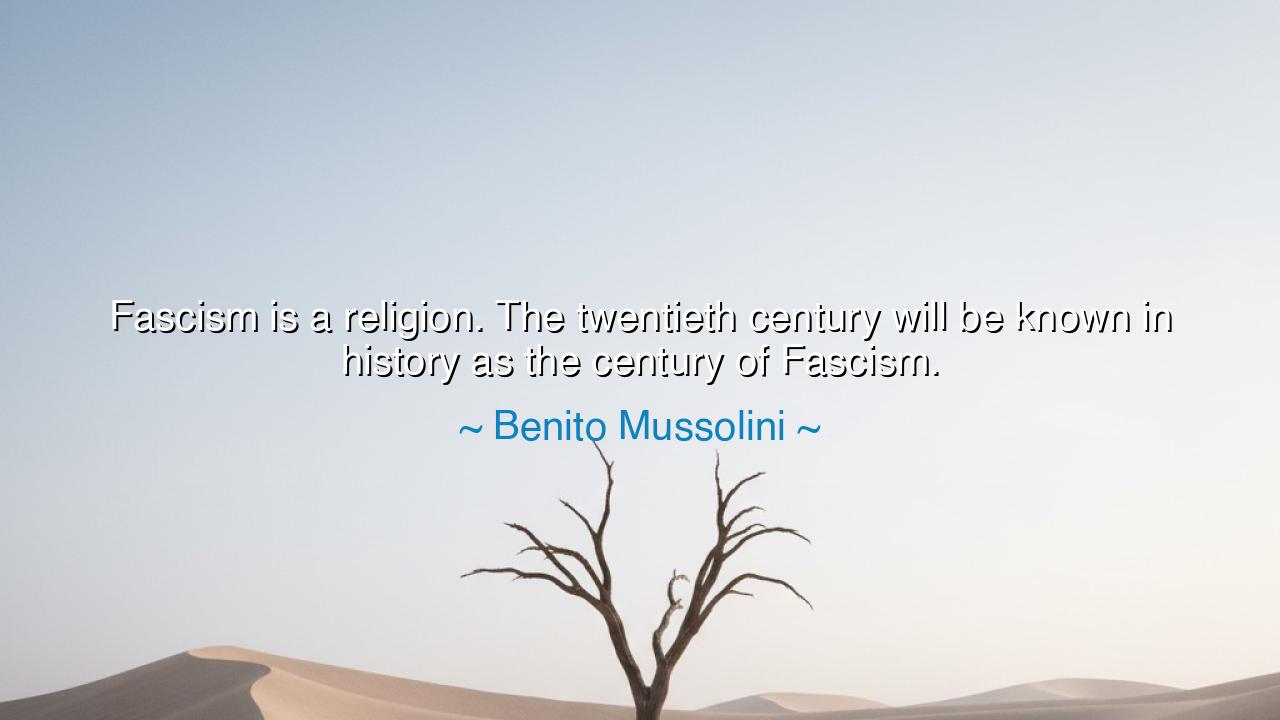
Fascism is a religion. The twentieth century will be known in
Fascism is a religion. The twentieth century will be known in history as the century of Fascism.






“Fascism is a religion. The twentieth century will be known in history as the century of Fascism.” — Thus proclaimed Benito Mussolini, the self-styled Duce of Italy, a man who clothed tyranny in the garments of faith. His words are at once a prophecy and a confession: that Fascism, for him, was not merely a political movement, but a creed — a new faith meant to command hearts, not just laws. In this statement, Mussolini reveals the soul of totalitarianism: the desire not only to rule over the bodies of men but to possess their spirits, to replace the sacred with the state, and to make obedience the highest form of worship.
To call Fascism a religion is to understand that Mussolini saw it as more than ideology. He saw it as revelation. Where religion demands faith, Fascism demanded fanaticism; where religion offers salvation, Fascism offered identity; where religion calls man to humility, Fascism exalted him into a god — the god of the nation, the god of power, the god of force. It was a religion without mercy, without grace, without love — a creed in which the altar was the state and the sacrifice was the individual. Mussolini’s vision was born from the ashes of a wounded Italy, humiliated by war and divided by despair. He offered unity, purpose, and pride — and in that promise, millions found the fervor once reserved for the divine.
The twentieth century, as Mussolini foresaw, indeed became the age of ideologies worshiped like gods. Fascism in Italy, Nazism in Germany, Stalinism in the Soviet Union — all arose as faiths for the disillusioned, replacing the cathedral with the party, the priest with the dictator. The people, weary of chaos, surrendered to order; weary of doubt, they embraced dogma. They raised banners instead of crosses, sang hymns of the nation instead of hymns of the soul. Mussolini’s prophecy was fulfilled — but not as he imagined. For though Fascism conquered hearts for a time, its temples would crumble beneath the weight of its own arrogance. The century that began with faith in power ended in mourning for freedom.
Consider the story of Adolf Hitler, Mussolini’s dark counterpart. He, too, turned politics into religion. The Nazi rallies at Nuremberg were not assemblies of citizens, but liturgies of devotion — choreographed spectacles of collective worship. The torchlight, the banners, the chants, the Führer’s voice echoing like prophecy — all were designed to awaken in man the ecstasy of submission. People did not follow Hitler because they reasoned; they followed because they believed. And when belief replaces thought, when devotion replaces conscience, then tyranny becomes not merely possible but holy. This is the terrible power Mussolini understood — and unleashed upon the world.
To call Fascism a religion is, then, to name its true danger. For ordinary tyranny seeks obedience, but sacred tyranny seeks worship. A man may resist a ruler, but he hesitates to resist a god. Mussolini’s Italy, like Nazi Germany, bound its people with ritual, symbolism, and myth, creating a moral universe in which the state was divine and the individual existed only to serve it. In that system, to doubt was blasphemy, to dissent was heresy, and to die for the nation was salvation. Such faiths burn brightly for a time — but they always end in ashes. For a creed built upon domination cannot endure, and a nation that replaces compassion with conquest destroys itself from within.
Yet within Mussolini’s boast lies a lesson for all ages. He was right that the modern world worships its own creations — not only fascism, but money, celebrity, ideology, and progress. Each generation builds new idols to bow before, forgetting that no human-made god can satisfy the hunger of the spirit. When politics becomes religion, when parties become faiths, when men trade freedom for belonging, the cycle begins anew. The face of tyranny changes, but its soul remains the same: the lust for control disguised as the promise of unity.
Let this be your lesson, O listener: beware any creed that demands your soul in the name of order or nation. The moment you are asked to worship power, you are asked to betray yourself. True faith lifts the spirit toward compassion and truth; false faith binds it to pride and obedience. The twentieth century bore witness to this truth in rivers of blood. Do not let the twenty-first forget it.
And so, remember Mussolini’s words — not as prophecy, but as warning. Fascism is a religion because it knows the hunger of the human heart for meaning — and it twists that hunger into chains. But the heart that is truly free, the mind that dares to question, the soul that refuses to worship false gods — these are the seeds of civilization’s renewal. Guard them well, for history shows that the idols of power will always rise again, seeking new temples to fill. It is your task, and that of every generation, to tear them down before they claim your worship once more.






AAdministratorAdministrator
Welcome, honored guests. Please leave a comment, we will respond soon